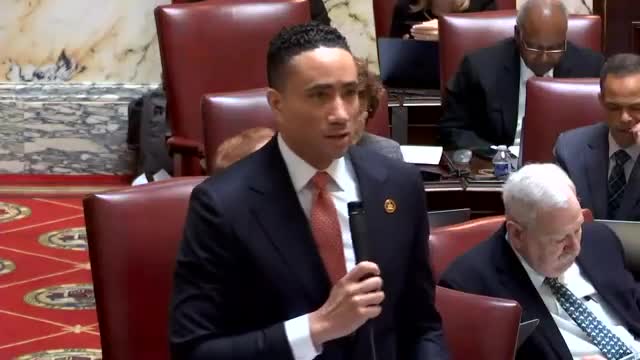Senate debates gun‑buyback rules; layover adopted after questions about destruction and training

Summary
Senators considered SB 444, which would codify requirements for gun buyback programs including mandatory destruction of firearms and components. Committee amendments were adopted but lawmakers raised questions about training uses and disposal of accessories; the Senate laid the bill over under the rule for further consideration.
Senators on the Maryland Senate floor on Feb. 18 debated Senate Bill 444, which would set requirements for gun buyback programs and require destruction of firearms and component parts to limit trafficking and the construction of untraceable "ghost" guns.
The bill’s sponsor, Senator Smith, said the measure reclassifies certain conduct related to gun buybacks, prescribes procedures and penalties for program violations, and codifies what the sponsor described as standard practice across Maryland. “The goal is to ensure that every component of the firearm, not just the regulated pieces like the frame or the receiver, were destroyed through this gun buyback program,” Smith said on the floor.
Why it matters: Sponsors said the change responds to incidents in other states where component parts were resold and later used to assemble ghost guns. The bill sets maximum fines of up to $10,000 for violations by a federally licensed firearms dealer or law enforcement agency and makes a person who conducts a buyback in violation of the law guilty of a misdemeanor with a similar maximum penalty.
During floor debate, the minority whip asked whether the committee amendments addressed concerns raised in testimony that law enforcement agencies need time to retain firearms involved in investigations. Senator Smith said law enforcement would retain firearms that are part of active investigations but that routine buyback firearms are intended to be destroyed and that the bill preserves investigatory exceptions. “We adopted those committee amendments. They came from the chiefs and sheriffs,” Smith said.
Several senators pressed the sponsor on whether agencies could keep certain firearms or accessories—such as expensive scopes—for training purposes. A senator who asked about training said keeping unique or malfunctioning firearms was useful for officer training; the sponsor replied that the bill does not allow law enforcement to retain buyback firearms for training and that the measure formalizes existing practice.
Committee amendments: The floor adopted two committee amendments (one technical; one altering the bill’s definitions and state‑funding reimbursement language). The sponsor later offered two additional floor amendments that were adopted without recorded opposition.
Outcome: After extended questioning about disposal practices and training needs, a senator moved and the Senate adopted a motion to lay the bill over under the rule. The motion was adopted and the bill was carried over for later consideration.
What’s next: The bill will return for further consideration; senators said they want to preserve investigatory exceptions while addressing trafficking and ghost‑gun risks.

